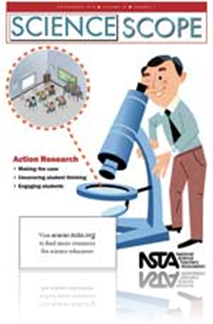All Science Scope resources
Journal Article
Scope on the Skies: The law of location
This article explains how the sky would look from different locations, specifically from other locations within our solar system. Answers to the following questions are addressed: Do the constellation patterns we see from Earth look different from an...
Journal Article
Science Sampler: Motivating middle school students to monitor and assess their learning
Our job as teachers is not only to teach science, but also to instill motivation for learning in our students. After many trials and failures, the author came upon a process to motivate most middle school students. The process consists of an initial ...
Journal Article
Uncovering Student Thinking in Science Through CTS Action Research
Curriculum top study (CTS) action research is a specific type of inquiry that combines curriculum topic study (Keeley 2005) with an examination of students’ thinking using formative assessment probes (Keeley, Eberle, and Farrin 2005; Keeley, Eberle...
Journal Article
Editor’s Roundtable: Need an answer? Research it yourself!
Action research can have a powerful impact on your classroom practice because you don’t have to scan through document after document to find solutions to your problems. Instead, you will develop solutions by analyzing the data you collect. Let the ...
Journal Article
Science Sampler: From speaking to writing in the structured English immersion science classroom
In most cases, structured English immersion (SEI) has replaced bilingual and English as a second language (ESL) programs as the preferred method of educating English language learners (ELLs). As a result, science teachers need specific strategies to ...
Journal Article
Message from the NSTA President: Imagine and Invent—Create a Great Future
The time is right for an emphasis on imagination and innovativeness in science education, both in students and in teachers. Change now dominates our economy and culture, and can only be realized through imagination and creativeness. Therefore, our ne...
Journal Article
Scope on Safety: NSTA’s portal into the safety zone
NSTA’s Science Safety Advisory Board recently launched the Safety in the Science Classroom portal, which contains safety resources for teachers, supervisors, and administrators. This month’s column provides a partial listing of the resources mid...
Journal Article
Science Sampler: Bees in the news—Connecting classroom science to real-life issues
While news articles are commonly used as resources for teaching and learning in language arts classes, their use in science classrooms is often limited. In this article, the authors share their experiences (in Ming’s class) using a newspaper report...
Journal Article
Fishbone Diagrams: Organize Reading Content With a “Bare Bones” Strategy
Fishbone diagrams, also known as Ishikawa diagrams or cause-and-effect diagrams, are one of the many problem-solving tools created by Dr. Kaoru Ishikawa, a University of Tokyo professor. Part of the brilliance of Ishikawa’s idea resides in the simp...



